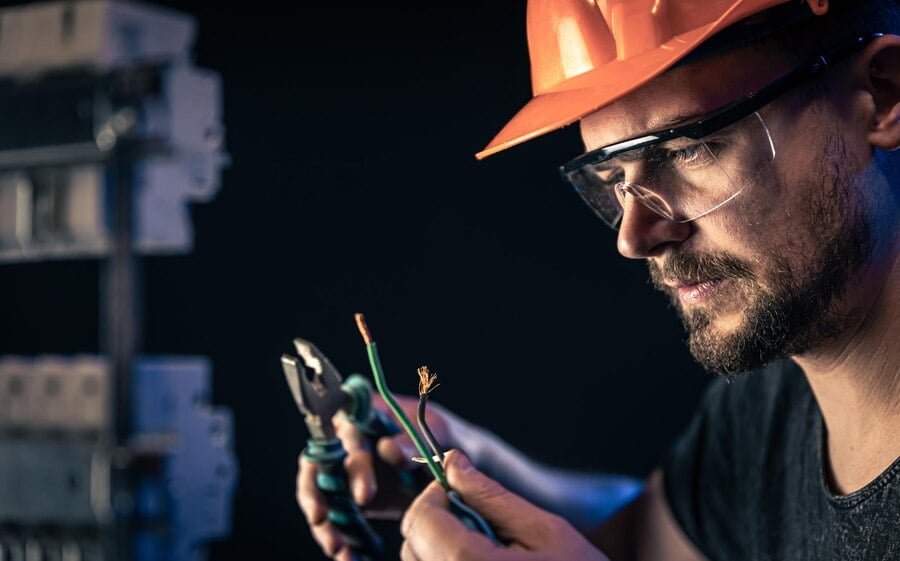Unplugging The 9-To-5: The Ultimate Guide To Launching Your Own Electrical Business As An Independent Electrician
by Abdul Aziz Mondal Business Planning Published on: 18 April 2023 Last Updated on: 23 May 2024

Are you considering a career as an electrician but aren’t sure where to start? There’s never been a better time to enter the field, with an increasing demand for skilled electricians across various industries. And if you’re looking for even more opportunities to grow and succeed, becoming an independent electrician and starting your own business might be the perfect path for you.
By pursuing this career path, you can enjoy the freedom and flexibility of working for yourself while tapping into a growing demand for your skills. In fact, a quick search for “jobs for electricians” will show you just how many opportunities there are for qualified professionals in this field.
In this article, we’ll provide a comprehensive guide on how to become an independent electrician and start your own business. From education and training to building your skillset and developing a business plan, we’ll cover everything you need to know to succeed in this exciting field.
So, whether you’re just starting out or looking to take your career to the next level, read on to discover how to launch your own successful electrical contracting business.
Education And Training
Becoming an independent electrician requires a solid foundation of education and training. While the exact requirements can vary depending on your location and the type of electrical work you plan to do, there are some general guidelines you can follow.
First and foremost, you’ll need to have a high school diploma or equivalent to pursue a career as an electrician. From there, you can pursue various pathways to gain the necessary knowledge and experience, such as vocational or technical schools, community colleges, or apprenticeships.
Apprenticeships are a popular choice for those interested in becoming electricians, as they provide on-the-job training and classroom instruction. During an apprenticeship, you’ll work under the supervision of a licensed electrician and learn the ins and outs of the trade. Apprenticeships can take several years to complete, but they provide valuable hands-on experience and can help you build a strong foundation of skills.
In addition to on-the-job training, you’ll also need to obtain certification and licensure to work as an independent electrician. The specific requirements can vary depending on your location, but in general, you’ll need to pass a test to become licensed and certified. This ensures that you have the knowledge and skills necessary to safely and effectively perform electrical work.
By pursuing the necessary education and training, you can gain the skills and knowledge you need to launch a successful career as an independent electrician. So, whether you’re just starting out or looking to take your skills to the next level, don’t hesitate to invest in your education and training.
Building Your Skillset
As an electrician, it’s crucial to continually build your skillset and stay up-to-date with the latest industry trends and technologies. Not only does this ensure that you’re providing the best possible service to your clients, but it also helps you stay competitive in a constantly evolving industry.
One way to build your skills is by gaining experience through on-the-job training and apprenticeships. By working with experienced professionals, you can learn new techniques and gain valuable insights into the trade. Additionally, you can seek out opportunities to work on different types of projects or in different environments to broaden your skillset.
Another way to build your skills is by pursuing additional certifications or specialized training. For example, you might consider becoming certified in specific areas, such as solar or wind energy systems. Doing some additional training to become a solar technician could mean you can work on lucrative solar panel fitting jobs, which are becoming increasingly popular. The cost of the training can be covered quickly this way and you can offer your services to a wider range of potential customers.
Keeping up with industry trends and emerging technologies is crucial to staying relevant as an independent electrician. Attending conferences, reading industry publications, and networking with other professionals can provide you with valuable insights into the latest developments in the field.
Regularly enhancing your skills and knowledge can help you distinguish yourself from your competitors and offer creative and practical solutions to your customers. That’s why it’s critical to invest in your ongoing education and keep pace with industry advancements to maintain a competitive edge in this continuously evolving field.
Developing A Business Plan
If you’re considering becoming an independent electrician and starting your own business, it’s essential to have a solid business plan in place. A well-crafted business plan can help you identify your target market, determine your services and pricing, and outline your marketing strategy. It also provides a roadmap for your business, helping you make informed decisions and track your progress over time.
When developing your business plan, start by identifying your target market. This might include residential or commercial customers or specific industries such as healthcare or construction. Understanding your target market can help you tailor your services and marketing efforts to reach the right customers.
Next, determine your services and pricing. What types of electrical work will you offer, and how much will you charge? Consider factors such as your level of experience, the complexity of the project, and the going rate in your area. You’ll also want to think about any equipment or materials you’ll need and factor those costs into your pricing.
Once you’ve determined your services and pricing, outline your marketing strategy. How will you reach your target market? Will you advertise online or in print? Will you attend trade shows or networking events? By developing a marketing plan, you can ensure that you’re effectively reaching your ideal customers.
Finally, create a budget and financial plan for your business. This should include estimates for startup costs, ongoing expenses, and expected revenue. Be sure to factor in any equipment, supplies, or licensing fees, as well as your own salary and benefits. By creating a financial plan, you can ensure that your business is financially sustainable and that you’re on track to achieve your goals.
Legal Considerations
When starting a business as an independent electrician, there are several legal considerations you’ll need to keep in mind. Here are some key factors to consider:
First, it’s important to understand the legal requirements for starting a business in your state or locality. This may include obtaining a business license, registering your business name, and obtaining any necessary permits or certifications. Be sure to research the specific requirements in your area and ensure that you’re in compliance with all applicable laws.
Next, it’s crucial to understand liability and insurance. As an electrician, you’ll be working with potentially dangerous electrical systems, and accidents can happen. Make sure you have liability insurance to protect yourself and your business in the event of an injury or property damage. You may also want to consider other types of insurance, such as workers’ compensation insurance or commercial auto insurance.
Finally, be sure to register your business with the appropriate agencies and obtain any necessary permits. This may include registering for state and local taxes, obtaining a federal tax ID number, and registering with any professional organizations in your field. By taking care of these legal considerations upfront, you can ensure that your business is operating legally and responsibly.
Building Your Brand And Marketing Your Business
As an independent electrician, building your brand and marketing your business is essential to attracting customers and growing your business. Here are some key strategies to consider:
First, develop a brand identity that reflects your business and values. Your brand should be distinctive and memorable, and it should convey your expertise and professionalism. This might include creating a logo, tagline, and color scheme that represents your business.
Next, create a marketing plan to attract customers. This should include identifying your target market, defining your unique selling proposition (USP), and outlining your marketing channels. Your USP is what sets you apart from your competitors, so be sure to highlight your strengths and unique services.
Finally, utilize digital marketing strategies to reach your target market. This might include creating a website that showcases your services and expertise, as well as social media accounts to connect with potential customers. Consider running targeted ads on social media or search engines to reach a wider audience.
Managing Your Business
To ensure the success of your business as an independent electrician, effective management is crucial. There are several key strategies to consider, such as managing your finances properly by invoicing clients in a timely manner, tracking expenses, and maintaining accurate records. Utilizing accounting software can also assist in managing your finances efficiently.
Building relationships with suppliers and vendors is also important in securing better prices and access to the necessary products and equipment for your business. Attending industry events and joining professional organizations can help you network with other professionals in your field.
As your business grows, you may need to hire employees and build a team. It’s crucial to carefully vet candidates and ensure they possess the necessary skills and experience for the job. Competitive salaries and benefits may be necessary to attract top talent. Overall, effective management of your finances, vendor relationships, and the team can contribute to the long-term success and growth of your business as an independent electrician.
Conclusion
To sum up, choosing to become an independent electrician and starting your own business can be a highly satisfying and fulfilling career path. However, it necessitates significant investment in education, training, and skill development. Moreover, to succeed, you need a robust business plan, sound financial management, up-to-date knowledge of industry trends and technologies, and a compelling brand built through effective marketing and networking efforts. With a strong work ethic and commitment to ongoing learning, you can build a thriving business and achieve success as an independent electrician.
By following the strategies outlined in this article, you can successfully navigate the challenges of starting and managing your own business as an independent electrician. Remember to continually build your skills, stay informed about legal requirements and liabilities, and maintain strong relationships with your suppliers and vendors. With dedication and hard work, you can achieve success and make a positive impact in your community as an independent electrician.
Read Also:







































































































